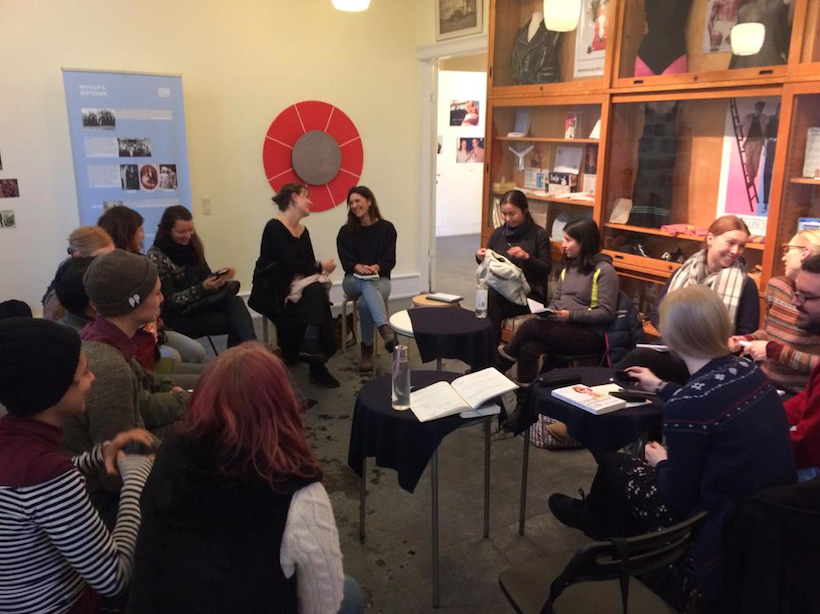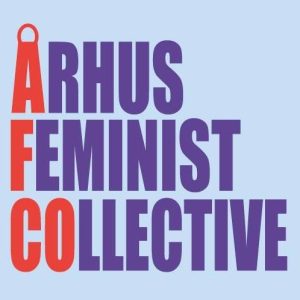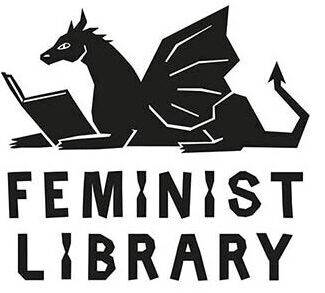Interview with Sophia Kier-Byfield
 Since the beginning of the lockdown, the Feminist Library book clubs have teamed up and created an international book club – a space for intersectional, feminist discussions beyond borders. Through the meetings of the international book club, we have met other fabulous feminists running book groups around the UK and beyond. Here, Magda Oldziejewska caught up with Sophia Kier-Byfield, co-founder of the Aarhus Feminist Collective and Reading Group – an English language book club in Denmark.
Since the beginning of the lockdown, the Feminist Library book clubs have teamed up and created an international book club – a space for intersectional, feminist discussions beyond borders. Through the meetings of the international book club, we have met other fabulous feminists running book groups around the UK and beyond. Here, Magda Oldziejewska caught up with Sophia Kier-Byfield, co-founder of the Aarhus Feminist Collective and Reading Group – an English language book club in Denmark.
Q: Hi Sophia! To start with, can you tell us a little bit more about your group?
A: I start ed the group in 2017, while I was living in Aarhus, Denmark, and since then it has grown into a bigger initiative called Aarhus Feminist Collective. We are currently a working group of four – myself, Pernille Sybrandt Hansen, Luisa Gould and Sille Mikkelsen. We’ve had different constellations of people since it started around the beginning of 2018, but it’s currently us four behind the scenes. It started as a reading group and it’s always been in English – even though it’s always been based in Denmark. Since 2018, we’ve also done a variety of other gatherings: film screenings, different types of discussion groups, talks and writing workshops. But the reading group is the backbone of our group’s programming and principles: reading and discussion. In terms of content and the discussion language, it’s in English. This has allowed us to have an international scope. Aarhus has a big international community – a lot of students coming from abroad to study there, and a lot of people from different places working there; so, because it’s in English, we are able to have this amazing international exchange. There are obviously some limitations – some people might feel that it may be more accommodating in Danish, which is something that we are thinking about for the future because there are inevitably some exclusions that happen there. But the flip side is that we have people from all around the world who come, and we can make a space for them when other spaces like this may not exist for them in the Danish context.
ed the group in 2017, while I was living in Aarhus, Denmark, and since then it has grown into a bigger initiative called Aarhus Feminist Collective. We are currently a working group of four – myself, Pernille Sybrandt Hansen, Luisa Gould and Sille Mikkelsen. We’ve had different constellations of people since it started around the beginning of 2018, but it’s currently us four behind the scenes. It started as a reading group and it’s always been in English – even though it’s always been based in Denmark. Since 2018, we’ve also done a variety of other gatherings: film screenings, different types of discussion groups, talks and writing workshops. But the reading group is the backbone of our group’s programming and principles: reading and discussion. In terms of content and the discussion language, it’s in English. This has allowed us to have an international scope. Aarhus has a big international community – a lot of students coming from abroad to study there, and a lot of people from different places working there; so, because it’s in English, we are able to have this amazing international exchange. There are obviously some limitations – some people might feel that it may be more accommodating in Danish, which is something that we are thinking about for the future because there are inevitably some exclusions that happen there. But the flip side is that we have people from all around the world who come, and we can make a space for them when other spaces like this may not exist for them in the Danish context.
Q: That’s great. Thank you for that introduction. Could you now talk a little bit more about the impact of the reading group, and particularly the international aspect?
A: I think the fact that we run the club in English has opened up some doors for people who have moved to Denmark for various reasons and have perhaps lost their previous community from where they’ve moved from. That was certainly the case for me, and it is one of the reasons why I started the reading group. It was obviously driven by wanting to read more feminist texts and have that kind of discussion group, but it was also just to meet people. A lot of us move all around the world for work or study these days, and when you move you leave things behind in terms of your political community or friendship circle. I think the international aspect has been that it creates a social network for people who have similar values and ethos no matter where they come from. You know, you’re looking for ‘your people’. It’s different to an organised social group at your school or workplace which is more formal and doesn’t have that political aspect to it.
It’s also about getting different perspectives. Often, in feminist discourse, there’s a critique of this very Western, Anglo-American point of view. And we’ve had the pleasure of talking with people from places like Egypt, Hungary, Poland, India and Kazakhstan, and it has been very enlightening for the group to have this intercultural exchange. This has led us to start another initiative, called Women of Aarhus, which is a series of talks where we ask international participants in the reading group whether they would like to give a talk on a topic of their choice. For example, my good friend Amira, who is Egyptian, talked about gender violence and sexual harassment in Egypt. She was the first speaker. We then went on to have speakers from a variety of different contexts such as China, Mexico, Guatemala, Nepal and Armenia, and it became a long-term project. We primarily held the events in a non-profit space called Café Mellemfolk, which is run by the Danish NGO Mellemfolkeligt Samvirke (ActionAid Denmark). Those events were always packed with people. I think people were really hungry to hear women’s experiences from different parts of the world. This is something that we haven’t been doing recently because of the pandemic. I think it would be good to channel some energy into reigniting it, because the storytelling aspect of the project is really powerful.
So this was another international part of the project that we were able to build as a collective. I don’t think we would have been able to do this if the group was primarily in Danish.
Q: This leads me quite nicely to my next question which is on the impact of book clubs more generally and the importance of those physical meeting spaces. And conversely – what do you think about the digital connection that’s now made possible at unprecedented levels, due to the lockdown?
A: I think it’s a really complex issue. Personally, it’s been an opportunity to remedy some of the exclusions in my own education. There wasn’t a huge focus on feminism or gender, sexuality, race, class or ethnicity – all of these intersecting issues – in my formal training. Starting the book group was a chance to create a self-directed curriculum. I think that this is one of the things that book clubs and reading groups can do: you can, as a group, create your own learning pathway, and you can constantly change it, moving with the tide of current affairs and learning what you want to. Book groups create new curricula and fill in some gaps that the mainstream education system doesn’t always give us.
I also think they can have a strong social impact. It can be really affirming. But equally I think we have to be really careful in thinking about book clubs and social change. I think they’re a part of the political landscape, but reading is not the whole solution. Jessa Crispin wrote a really interesting article in The Guardian recently about, for example, the amount of book clubs and reading groups that have started as a response to the Black Lives Matter movement, or its most recent incarnation. She argues that we need to think more carefully about how our intellectual or discursive practices connect with structures of oppression beyond our closed circles of people who agree with each other. One can be challenged and have debates in these reading groups, but quite often we are pretty much in agreement, at least on a fundamental level.
So, thinking more about impact in terms of social change, I think it’s necessary to see beyond how they’re nourishing for us, as people who are already on the side of, say, feminism or anti-racism, and think about how reading can be implemented beyond that – who are we having conversations with, how are these texts being implemented in mainstream schooling, what kind of political listening are we doing in situations that make us uncomfortable. We need to be clear about what the aim of our reading is, especially if we’re facilitating. Recently, as organisers, the Aarhus Feminist Collective has been asking ourselves a lot of these questions and thinking about how we can go from just creating conversation to also, perhaps, raising funds for causes that we think are important, or hosting discussions in different contexts. For example, we’re primarily in non-profit or arts spaces, which attract a certain type of demographic. I think that moving around and thinking about the different groups that we want to engage with, rather than just being in spaces that make us feel comfortable, is really important in terms of impact.
I think we also have to consider what reading as an activity entails. It’s a huge privilege to have spare time to read or money to acquire materials. In the UK, for example, 1 in 6 adults struggles to read/has issues with literacy (figures from the Reading Agency). So, when we think about reading, there are many different access and inclusivity issues that arise in terms of the pedagogical structures of these groups and the effects that we’re trying to have.
With the Aarhus group, we try to have free resources as much as we can – whether that’s using free articles or podcasts available online, or making sure that the books are available in the library if we are doing a book. We’re always trying to get around the issue of having to pay for a book or a reading resource. These are just small steps that I think are really important to take to get around the limitations of the reading group format.
In terms of the physical space aspect – our permanent home is actually in an exhibition space called rum 46 (room 46), which is a small, artist-led project. And whilst most of our events are free to access, we have to think about who feels comfortable in those spaces. They’re like our homes away from home, but they might not be the kind of spaces that everyone feels comfortable or welcome in; they might feel more comfortable going into a library, for example. So we’re thinking a lot about space and the political currency that different spaces have.
When you’re trying to frame your work as political or activist, being in a big institutional space can be off-putting as well. For instance, last year, I co-hosted an event in Venice associated with the Biennale, and we invited local organisations campaigning for better access to abortion to join us. We didn’t really get any response. I can’t help but feel that that physical space of an art institution was perhaps not aligned with the kind of space that local groups might usually inhabit. Even though it made sense for us to be in that specific space, it didn’t make as much sense in the local context in relation to the issues we wanted to explore. Physical space can be really crucial if we think about the aims and impact that we want to have; depending on the event that you want to hold, moving around might make more sense.
In terms of the online space: I think it’s currently opening up a lot of opportunities. Although it also closes some down (for example, the Women of Aarhus project has been on hold, because it’s very much premised on the person presenting being in front of a crowd, and the kind of emotions created by the person telling the story), on the whole, the online reading groups that we’ve been putting on so far have been really great. This is because people who aren’t in the country where you’re holding the event can join in. Friends from Egypt, the Netherlands, Denmark, the UK and elsewhere have all been able to come into the same online space and share thoughts. I think online learning encounters really allow for cross-border discussion, and they can democratise things too, to an extent. Of course not everyone has access to a stable internet connection or a device. There’s privileges around internet access too.
I do see some potential in at least partially remaining online in the future. For example, I’m no longer in Denmark, and now I can be in the reading group meetings again with my co-organisers, friends and all of the new faces. Each meeting has a new composition as it is an open reading group, so you meet new people each time and get new input. Being online has also allowed us to continue through the pandemic. I’m kind of excited to keep some activity online no matter what happens in terms of the COVID-19 situation.
Q: That’s really great, thank you. A lot of the points you’ve raised are ones that we have also been asking ourselves in our book clubs and about our physical and new online spaces. To end with, I want to ask you a question about a memory – a foundational memory you might have of a book club or a library that has led you to where you are now and doing what you do.
A: Yes, sure. That’s such a lovely question!
In terms of a library – I can definitely think of one. It’s actually the Glasgow Women’s Library.
I was visiting a friend in Glasgow toward the end of 2016 and he took me to the Women’s Library. It was the first time I’d been to a feminist library that was dedicated to the issues that were starting to become really important in my life and politics. Just going into that space was a huge moment.
In Aarhus, where I had been living for about a year at the time, there is a Women’s Museum. It turned out that the library in Glasgow and the museum in Aarhus had had some dialogue. There are so few spaces dedicated to women’s history, writing and art – and yet there was this really great connection!
During that trip to Glasgow I also went to a Christmas party with my friend. There were a lot of people talking about the different reading groups they were in and what they were reading. Suddenly everything seemed to align – going to the Women’s Library, living in Aarhus where there was the Women’s Museum, thinking about starting a reading group and then being at this party where everyone was talking about their different reading groups.
I started the group soon after. Initially the reading group in Aarhus was based at the Women’s Museum. We were there for a pretty good chunk of time and it was a good starting point. In the end, we realised we needed a bit more of a flexible space. The Glasgow Women’s Library would be a dream place to host the reading group, if I ever got to go back.
Q: That’s brilliant! I was not expecting you would talk about the Women’s Library when I asked the question! That’s such a nice note to end on! Thank you so much for your time, and I hope that we can continue this discussion. It has been really constructive!
A: Same here!
